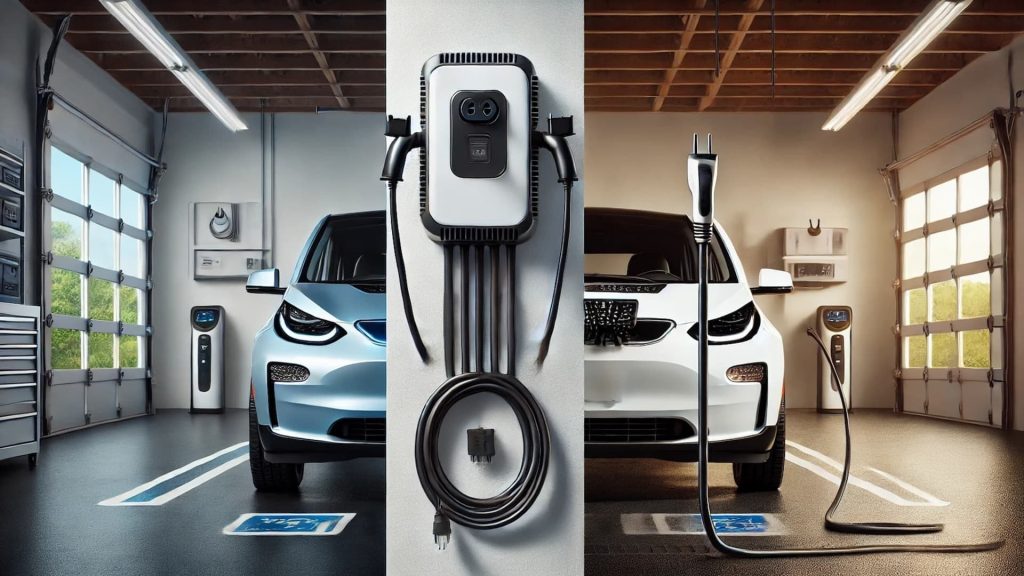Choosing the Right EV Charger: Hardwired vs. Plug-in Models
As the number of electric vehicles (EVs) on the road grows, it’s important to make sure you have the right home EV charger. Whether you’re a new EV owner or upgrading your existing charger, one critical decision you’ll face is whether to opt for a hardwired or plug-in charger. Depending on how your home is set up, how much charging you need, and your long-term goals, each type has pros and cons.
The major differences between hardwired and plug-in EV chargers are talked about in these articles. They cover things like power output, safety, installation, and how useful they are in general.
Hardwired EV Chargers: A Reliable, Long-Term Solution
If you’re seeking a robust and permanent solution for home EV charging, hardwired chargers are often the go-to option. Below are five reasons why hardwired EV chargers tend to be better suited for long-term use:
- Higher Power Output
Hardwired chargers typically support higher amperage, allowing faster charging. This is particularly important for higher-output chargers, like 48-amp units, which may not be supported by standard outlets. - Enhanced Safety
A hardwired connection is more secure and less prone to wear and tear compared to a plug-in charger. There’s no risk of loose connections or damage to plugs, which can lead to overheating or electrical issues. - Permanent Installation
Hardwiring ensures the charger is securely mounted and permanently installed, which is ideal for long-term use. This reduces the risk of accidental disconnection and ensures a cleaner, more professional installation. - Weather Resistance
Hardwired chargers are typically more durable and suitable for outdoor installations. They are better protected from the elements compared to plug-in units, which can be more exposed to water, dust, and other environmental factors. - Building Code Compliance
Some local building codes or HOA regulations may require EV chargers to be hardwired, especially for outdoor installations, to ensure compliance with safety and electrical standards.
Overall , hardwired chargers are often the preferred choice for a more reliable, long-term EV charging solution. Because they can hold more power, are safer, and last longer, they are perfect for homes who want an installation that won’t need to be changed in the future.
Plug-in EV Chargers: Convenience with Trade-offs
Plug-in EV chargers may appeal to homeowners who prefer flexibility or a simpler setup, but they do come with several drawbacks. Here are five disadvantages of plug-in EV chargers that might make you reconsider this option:
- Limited Power Output
Plug-in chargers are often limited to lower amperage, typically around 32-40 amps, due to outlet restrictions. This means slower charging times compared to hardwired options that can support higher amperage. - Potential for Loose Connections
Repeated plugging and unplugging can cause wear and tear on both the outlet and plug, leading to loose connections. Loose connections increase the risk of overheating and potential electrical hazards. - Reduced Weather Resistance
Plug-in chargers are more vulnerable to environmental factors like water, dust, and temperature extremes, especially if the outlet is located outdoors. This can lead to issues like moisture damage or corrosion over time. - Aesthetically Less Appealing
Plug-in chargers often result in a less streamlined installation with visible cords and plugs. The charger may not look as neat or integrated into the home, compared to a hardwired unit. - Outlet Compatibility and Placement
Not all homes have the appropriate 240-volt outlet in the ideal location for charging, and installing a dedicated outlet can add to the overall cost. In some cases, the existing outlet may not be rated for the continuous power draw required by EV charging.
These factors can make plug-in chargers less desirable for homeowners seeking a robust, long-term EV charging solution. While they may be convenient, they are also limited in terms of power, safety, and how they look.
Conclusion: Which Option is Right for You?
The decision between a hardwired and plug-in EV charger depends on your specific needs, long-term goals, and home’s electrical infrastructure.
People who care about efficiency, safety, and a clean, professional installation should get a hardwired charger. For charging faster and more demanding EVs, they are great because they can put out more power.
When it comes to power and durability, plug-in chargers may not be the best choice, especially for outdoor setups or homes that don’t have the right outlets set up.
Before making a choice, MaxElectric suggests that you look at your home’s current electrical system, your long-term charging needs, and the building rules in your area. EV charger installation and professional tips are what we do here if you’re in San Francisco.
